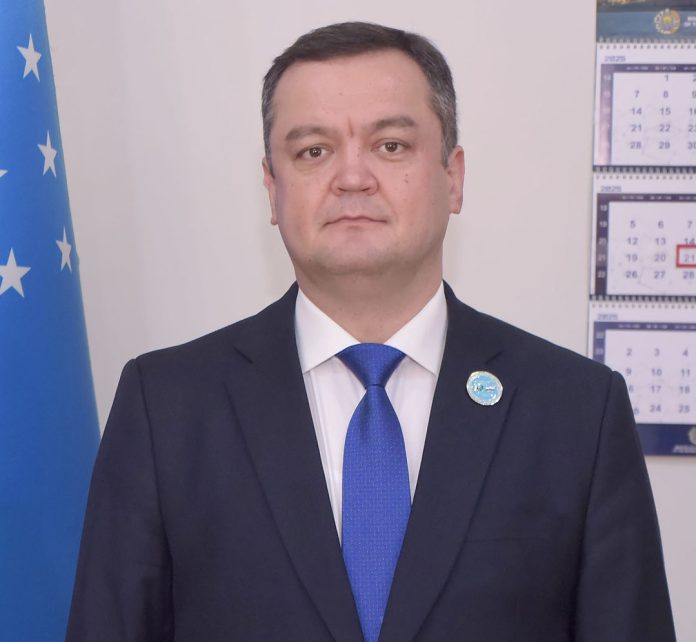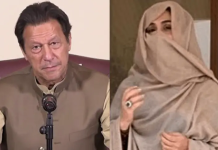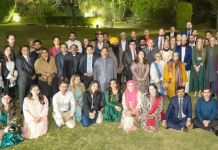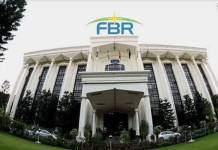Ambassador Alisher Tukhtaev says the rail project holds transformative potential for regional trade and integration
Ansar Mahmood Bhatti
ISLAMABAD: Ambassador of Uzbekistan to Pakistan, Alisher Tukhtaev, delivered an in-depth overview of the growing bilateral ties between Uzbekistan and Pakistan at a media briefing session held at the Uzbek Embassy in Islamabad. The event brought together representatives from Pakistan’s leading media outlets, television channels, radio stations, and news agencies.
In his opening remarks, Ambassador Tukhtaev emphasized that the purpose of the session was to inform the Pakistani public about the evolving and multifaceted cooperation between the two nations. He underlined that the Uzbek-Pakistani relationship is rooted in a shared history, culture, religion, and mutual respect, and is now advancing into a strategic partnership.
The ambassador noted that the frequency of high-level meetings is evidence of the growing trust between both countries. He referred to the official visit of Prime Minister Shehbaz Sharif to Uzbekistan in February 2025 as a major milestone in bilateral relations. During the visit, several agreements were signed, and a Strategic Partnership Council was established, reflecting the two governments’ commitment to elevate relations to a higher level.
A major highlight of the visit was the reaffirmation of support for the Trans-Afghan Railway Project, which seeks to link Uzbekistan, Afghanistan, and Pakistan through a regional connectivity corridor. Ambassador Tukhtaev said this project holds transformative potential for regional trade and integration. He also pointed to several high-level engagements that have occurred on the sidelines of major international forums, including the ECO Summit in Khankendi and the Inter-Parliamentary Union Assembly, which further reinforced the commitment of both nations to practical cooperation.
A significant development took place in June 2025, when the foreign ministers of both countries signed a Joint Action Plan during the OIC Foreign Ministers’ meeting in Istanbul. The following month, Uzbekistan, Pakistan, and Afghanistan signed a Framework Agreement in Kabul to conduct a joint feasibility study for the railway project, a crucial step towards advancing regional connectivity.
Touching upon economic cooperation, the ambassador stated that Uzbekistan’s GDP reached $115.6 billion in 2024, while bilateral trade with Pakistan exceeded $400 million. In just the first half of 2025, trade reached $253.7 million — a 123% increase over the same period last year — making Uzbekistan Pakistan’s largest trading partner in Central Asia. Despite this growth, both sides aim to push the trade volume to $2 billion by removing trade barriers, improving logistics, and enhancing business-to-business ties.
He outlined the success of recent trade exhibitions held in Lahore, Islamabad, and Karachi under the “Made in Uzbekistan” and “Food Fest Uzbekistan” banners. These events collectively generated more than $120 million in trade agreements and featured hundreds of Uzbek companies engaging directly with Pakistani businesses. To facilitate trade operations, Uzbekistan-Pakistan Trade Houses have been opened in Lahore and Karachi, and significant progress is being made on banking cooperation to streamline mutual payment systems. The Preferential Trade Agreement (PTA) is under review, with plans to increase the number of goods covered from 17 to 100.
Ambassador Tukhtaev said Uzbekistan is also looking to enhance regional connectivity through Pakistan’s ports of Karachi and Gwadar, and is discussing a trilateral transit trade agreement with Afghanistan and Pakistan. A joint transport and logistics company is also being planned to improve cargo movement.
On the cultural and humanitarian front, the ambassador highlighted growing engagement in tourism, education, youth exchange, and cultural events. Uzbekistan has eased visa rules for Pakistani citizens and launched direct flights between Tashkent and Lahore in April and between Tashkent and Islamabad in June, which are expected to boost tourism, education, and business ties.
He noted that Uzbekistan’s participation in Pakistan’s cultural landscape has grown significantly. Uzbek delegations took part in events such as the Lok Mela Festival, the Charity Bazaar, and a Nowruz celebration in Islamabad. Promotional exhibitions have also been held at venues like Centaurus Mall. He mentioned a visit by Namangan State University to Lahore, as well as the Uzbekistan-Pakistan Young Entrepreneurs Forum, which was held in June as part of Global Youth Festival activities.
Several Pakistani ministers have participated in major events in Uzbekistan. The Minister for Climate Change attended the Samarkand International Forum, the Minister for National Heritage visited Samarkand for its designation as Cultural Capital of the Islamic World, and the Minister for Law and Justice took part in the Tashkent Law Spring forum. These exchanges, the ambassador said, have helped strengthen institutional and cultural cooperation.
A recent highlight was the departure of 16 Pakistani bikers on the “Central Asia Tour 2025,” which will cover Pakistan, Afghanistan, Uzbekistan, and Tajikistan. This initiative is seen as a powerful symbol of people-to-people connectivity and regional friendship.
In conclusion, Ambassador Tukhtaev called on Pakistani businesses and investors to take advantage of Uzbekistan’s promising economic environment. He described the country as business-friendly, with an attractive tax regime, low utility costs, rich natural resources, and a strategic location at the heart of Central Asia. He also emphasized Uzbekistan’s special economic zones, growing sectors like textiles and pharmaceuticals, and a skilled, youthful labor force.
He urged the media to help promote Uzbekistan as a key destination for trade, investment, and tourism, and extended an open invitation to the Pakistani people to visit and explore opportunities in his country. He concluded by expressing confidence that the two countries would continue to build on their strong foundations and make further progress by the end of the year.
The event concluded with a question-and-answer session and a renewed call for enhanced cooperation across political, economic, cultural, and people-to-people domains, reaffirming the robust strategic partnership between Uzbekistan and Pakistan.

















